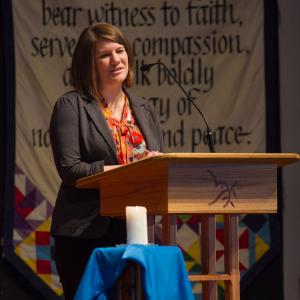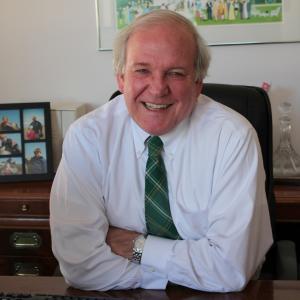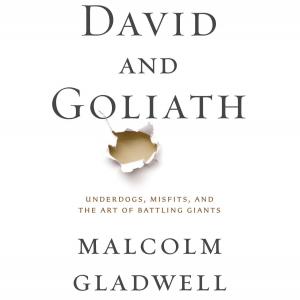Kara Lofton is online assistant for Sojourners.
Posts By This Author
Fast for Families Returns to Washington
Washington, D.C.—The national “Fast for Families Across America” bus tour campaign ended their journey yesterday in front of the U.S. Capitol building on the National Mall where hundreds gathered in support.
The buses, which returned to Washington after covering more than 90 congressional districts during a seven week tour, joined a female immigration advocacy group, We Belong Together—Women for Commonsense Immigration Reform, whose members have been fasting and praying for the House to pass reform that’s needed to keep their families together.
Rachel Held Evans: Saying the Things Pastors Can't
You can certainly get community outside of church, says bestselling author and blogger Rachel Held Evans, but that doesn’t mean it’s not worth being part of a church community.
“Church forces us into relationship with those who are different than us,” Rachel told Sojourners. As a follower of Christ, she said, I have to be ready and willing to be in community with those who are different than me.
I recently caught up with Evans at Eastern Mennonite University in Harrisonburg, Va. It was her ninth public appearance in the eight weeks as she bounced from Texas and the Midwest to the East Coast and back to Texas, with a foray to Michigan.
Rachel has made her career out of vocalizing what others are feeling, but can’t articulate quite as clearly.
Faith in Action: A Look at Public Theology Professor Mike McCurry
“Public theology is the way in which faith professes action in the public square,” explained Mike McCurry.
This idea — that there is a connection between your spiritual faith and what you do in politics — is an underlying theme in McCurry’s journey from press secretary for former President Bill Clinton to joining the faculty at Wesley Theological Seminary in Washington, D.C., as professor of public theology.
i-Lust and Other Confessions in a Millennial World
I lust. The words almost seem like they could be a tagline for a new Apple product — an appropriate image perhaps for a generation that is glued to our smart phones. Or perhaps the words are better suited in a kind of Descartes revolution for the 21st century, “I lust, therefore I am.” In either scenario, the words are an accurate reflection of the inescapable truth that lust is consuming all of our lives.
In the church, the word lust has strong sexual connotations. It is a word we are ashamed of and work hard to ignore. When we do talk about lust, it is mostly in the context of uncomfortable sermons or youth group sessions about dressing modestly, not looking at porn, and not gazing at one another with desire. We also often think of lust as a sin that plagues only men — particularly young men with “raging hormones” and that it is something they need to “break free” from.
Essentially the message has become, “If you do lust, don’t; if you don’t lust, good.” But such assumptions do not accurately represent the complex and diverse ways that lust manifests itself in our lives. That being said, I sometimes think that if the seven deadly sins included a clause for a sin that was more deadly, feared, and misunderstood than all of the rest, this would be it.
Unintended Journeys -- Showing the Effects of Natural Disasters and Climate Change
“Humanity is intimately tied to the world we live in, and every societal action and technological advance has an effect on the earth,” reads one of the plaques in the current Unintended Journeys exhibit at the Natural History Museum in Washington, D.C.
The temporary exhibit, which runs until Aug. 13, is a powerful photographic portrait of the catastrophic effects environmental disasters are having on millions of people around the world.
The exhibit focuses on five different countries that have recently experienced or continue to experience severe weather conditions that have caused displacement, migration, intense hardship, and death for inhabitants. The disasters covered are the Hurricane in the Gulf, the Earthquake in Haiti, the Tsunami in Japan, Flooding in Bangladesh, and Desertification in East Africa.
'Son of God' Falls into Trap of Most Jesus Depictions
Son of God is Hollywood’s take on the life and teachings of Jesus of Nazareth. While the producers clearly tried hard to use modern filmmaking techniques to bring scripture to the big screen, the attempt fell flat somewhere between the use of action-sequences, swelling music reminiscent of old Westerns, and unconvincing acting — Jesus is played by Portuguese actor Diogo Morgado, who managed to look irritatingly self-satisfied for most of the movie.
Since faith is such a personal, spiritual experience, it begs the question: Is it possible to make the life and ministry of Jesus into a film that accurately reflects Christianity, or does such an effort cheapen beliefs?
GRAPHIC: Hipster Faith
Nadia Bolz-Weber's church, House for All Sinners and Saints, is not your typical Lutheran church.
Immigration Activists Arrested in Civil Disobedience Outside White House
This President’s Day, about 20 church leaders, sympathizers, and undocumented immigrants were arrested in front of the White House as part of an act of civil disobedience to protest the nearly 2 million people who have been deported under President Obama.
The core group and about 40 supporters gathered around 1 p.m. on Monday afternoon in Lafayette Park in front of the White House. They held signs that said, “Praying for Relief” and “#Not1moredeportation,” and sang hymns in between short megaphoned speeches that told personal stories. They called for immigration reform. “Not one more, not one more,” they chanted together in both English and Spanish.
The event was organized by Bishop Minerva G. Carcaño of the United Methodist Church, who was the first Hispanic woman to be elected to her position.
In 'David and Goliath,' Gladwell Provides Fresh Perspective on the Underdog
What if what you thought were advantages were actually disadvantages? And what you thought were disadvantages ended up being what actually makes people successful?
So embarks best-selling author Malcolm Gladwell of Blink, The Tipping Point, Outliers, and What the Dog Saw in his new book: David and Goliath. In the same clear, concise style that made his other books so intriguing, Gladwell challenges yet another widespread assumption — that being the underdog tends to make one an underdog forever.
Instead he argues that being the underdog can give one the upper hand. In his signature approach, Gladwell supports his hypothesis with a series of narratives, from the classic case of David and Goliath to the forgiveness one Canadian Mennonite woman was able to work towards after her daughter was murdered. Like his previous books, David and Goliath is both entertaining and thought provoking and obliges readers reflect over their lives and reconsider personal “disadvantages” that actually required them to learn skills they otherwise might not have had.






